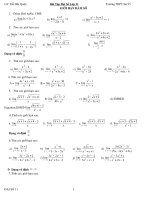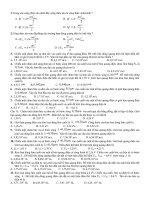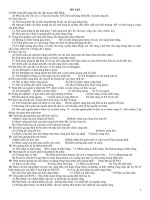bai tap tong hop on tap unit 8,9 rat hay
Bạn đang xem bản rút gọn của tài liệu. Xem và tải ngay bản đầy đủ của tài liệu tại đây (89.16 KB, 6 trang )
I. Choose the best answer: (2ms)
1. That’s very kind…………… you. ( to / of / for / about)
2. Tet or Lunar New Year holiday is the most important…………….for
Vietnamese people. ( party / celebration / anniversary / leisure time)
3. She likes the full- moon festival………………….happens in mid- Fall.
( who / which / it / when)
4. She works late ……………Mondays and gets home
……….seven……….the evening. ( in – at – on / in - on – at / on – at – in
/ on – at – on )
5. She couldn’t go to work………………she is tired. ( but / and / or / as)
6. I have no money……… I can’t buy my mother a present. ( though / if /
even though / because)
7. ……………… Liz has an exam tomorrow, she is watching TV now.
( Even though / Even if / Because / Unless)
8. Nga, ……………is standing over there, is my best friend. ( that / she /
whom / who)
9. In Australia, Christmas season is in……………………….(spring /
summer / winter / autumn)
10. Family members ………….lives apart try to be together. ( who / whose /
whom / which)
11. Neil Armstrong, ………………….walked on the moon, in the USA. ( who
/ se / that / which)
12. I love this bike……………is a present from my uncle. ( who / whose /
which / it)
13. My grandfather can work very hard……………….he is very old now.
( though / however / but / because)
14. …………………the weather was not good, we decided to stay at home.
(If / Though / Therefore / Since)
15. Hung tried to go to school today………………he was very tired. ( but/
because / although / or )
16. It’s nice…………………… you to say so. ( of / to / for / at)
17. Thuy’s grandma turned the television……… to see the weather forecast. (
on / off / up / down)
18. A funnel – shaped storm passing over land below a thunderstorm is called
a………….( typhoon / tidal wave / tornado / hurricane)
19. The word………………means “ big wind” in Chinese. ( hurricane /
tornado / typhoon / tsunami)
20. Mr. Green’s…………………….of humor distinguishes him from others. (
feeling / temper / hobby / sense)
21. Let me……………….you on your success in the examination.
( encourage / distinguish / celebrate / congratulate)
22. ………….Mother’s Day and Father’s Day are not very popular in Viet
Nam, we give our parents on their birthdays. ( Because / So / However /
Although)
23. Auld Lang Syne is a song…………… is sung on New Year’s Eve in
Scotland. ( whose / who / whom / which)
24. I am so………………of my father and love him very much. ( alike / proud
/ keen / interested)
25. We are very hungry…………………… we cannot eat anything. ( and /
although / so / but)
26. Tidal wave are the result of an abrupt………………in the underwater
movement of the Earth. ( exchange / difference / shift / turn)
27. Sometimes we can …………………. An earthquake, so we can save a lot
of lives. ( cause / warn / predict / show)
28. It may rain this afternoon, so don’t forget to bring……………….an
umbrella. ( on / with / up / along)
29. Here is the weather…………. Hanoi will have temperatures between 25C.
( forecast / prediction / guess / trial )
30.When a tropical ……………reaches 120kph, it is called typhoon in
Asia. ( rain / wind / cloud / storm)
31.Tornadoes are……………storms, which pass overland below a
thunderstorm. ( egg- shaped / funnel – shaped / disc – shaped / L-
shaped)
32.Most earthquakes in the world………….in the Ring of Fire.
( succeed / get / occur / come)
33. Mark Twain, ………….is a famous American writer, wrote “ The
Adventures of Tom Sawyer”. ( he / whom / who / that)
34. The cyclone of November 1970 in Bangladesh, which killed about
500.000 people, was one of the worst natural…………… of the 20
th
century. ( collapses / hazards / disasters / deaths)
35. Vietnam is a tropical country…………….has a lot of beautiful scenery.
( it / where / that / what)
36. On Passover, people celebrate…………… from slavery. ( dependence /
power / boredom / freedom)
37. Tet is time for Vietnamese families to clean and…………their houses.
( hang / enjoy / decorate / prepare)
38. Our neighbor………… name is Nam will move to England next week.
( whose / whose his / his / which)
39. My brother has to go work……………….it is raining very hard. ( even
though / but / however / so)
40. Nguyen Du was the writer…………………….wrote “ Kieu”. ( who /
whom / where / who did)
II. Read the text carefully, then answer the questions below ( 2,5 ms)
1. Almost a hundred thousand people were killed and half a million homes
destroyed as a result of an earthquake in Tokyo in 1923. The earthquake
began a minute before noon when habitants of Tokyo were cooking their
midday meals. Thousands of stoves were overturned as soon as the earth
began to shake. As a result, small fires broke out everywhere and quickly
spread. The fire engines were prevented from going to help because many
of the roads had cracked open. It was impossible to use fire fighting
equipment as most of the water pipes had burst. Consequently, over ninety
percent of the damage was caused by fire rather than by the collapse of
buildings.
1. What happened when there was an earthquake in Tokyo in 1923?
2. When did the earthquake begin?
3. What were habitants of Tokyo doing when the earthquake began?
4. What caused over ninety percent of the damage?
5. What should you do if there is an earthquake?
2. If you live in an earthquake zone, you should take some time to look
around your house. Place heavy books on the bottom shelf of your
bookshelves. Block the rollers on your fridge and washing machine to
prevent them from moving. Put hanging potted plants in plastic containers.
Check the mirrors in your bathroom and bedroom. Make sure they can’t
move. Don’t put your bed next to a window. Planning where you are
going to be during an earthquake is very important. The first thing to
remember is to stay inside. Then you should sit under a strong table or
doorway, or stand in the corner of a room.
1. What should we do if we live in an earthquake zone?
2. Where should we place the heavy books?
3. Why we must block the rollers on the fridge and washing machine?
4. Where should we stay during the earthquake?
5. Is it important to plan where we are going to be during the
earthquake?
3. Yesterday afternoon a 35- year – old house narrowly escaped death when
a tree blew over and fell onto her house, completely destroying it. “ I was
working in the garden at that time”. She explained “It was quite windy. I
heard a strange noise coming from our tree. The earth round the bottom of
the tree was moving. Suddenly the wind blew a little stronger, and I
watched it crash onto the roof” The Bowles family are staying with friends
while their house is rebuilt.
1. How old was the housewife?
2. How was her house destroyed?
3. What did she hear?
4. Was she injured? Why?
5. Where were the Bowles family then?
4. Earthquake: Ninety percent of earthquake occur around the Pacific Rim,
which is known as the “ Ring of Fire” . In 1995, a huge earthquake struck
the city of Kobe in Japan. A large number of people were killed when
home, office blocks and highways collapsed.
Tidal waves: Tidal waves are the result of an abrupt shift in the
underwater movement of the Earth. In the 1960s, a huge tidal wave hit
Anchorage, Alaska. The tidal wave traveled from Alaska to California!
Typhoons: When a tropical storm reaches 120 kilometers per hour, it is
called a hurricane in North and South America, a cyclone in Australia, and
typhoon in Asia. The word “ typhoon” come from Chinese: “tai” means “
big” and “ feng” means “ wind”, so the word “ typhoon” means “ big
wind”.
Volcanoes: We can usually predict when a volcano will erupt. Mount
Pinatubo, which is a volcano in the Philippines, erupted in 1991. It was the
world’s largest volcanic eruption in more than 50 years. Hundreds of
people died, but thousands were saved because scientists had warned the
about the eruption.
1. Where do most of earthquakes occur?
2. When can a tidal wave occur?
3. What does the word “ typhoon” mean?
4. Can we predict a volcano?
5. Was the Mount Pinatubo the world’s largest volcanic eruption in
more than 50 years?
III. BAI TAP 1 DIEM
A. Fill in the blank with the correct word : “ although , go on , because ,
whom, who” ( 1 mark)
1. If we………………………wasting water, there will be a shortage of
fresh water in the few decades.
2. My sister…………………….wasn’t feeling very hungry didn’t want
to go to the restaurant.
3. He ate all the fruits…………… they were green.
4. She went to bed early…………………… she was sick.
B. Complete the sentences using “ and, so , or, because , although , but”: ( 1
mark)
1. I like Mary very much……………………… I don’t like her
brother.
2. We enjoyed learning English………….we find it very difficult.
3. He did the test well…………I did, too.
4. Would you like to play soccer……………volleyball?
C. Complete the sentences using “who , whom , whose , which”: ( 1 mark)
1. This is the man………… daughter is my girl friend.
2. The exercise………….I am doing now is very interesting.
3. The girl…………has curly blonde hair is my pen pal.
4. He is the person………….everyone can trust.
D. Complete the sentences using “ and, so , or, because , although , but”: ( 1
mark)
1. She kept on studying………….it was very noisy.
2. Ba likes reading……………drawing.
3. He is tired…………….he stayed up late watching TV.
4. Tom is sick……………………he must go to school today.
IV. Use the words given in brackets to combine each pair of sentences
into one ( 3 ms)
1. Tet is a festival. Tet occurs in late January or early February.
( Which)
2. I’d love to play volleyball. I have to complete an assignment. ( But)
3. She broke the cup. She was careless. ( Because)
4. He couldn’t sleep. He was tired. ( Although)
5. The an was Ann’s brother. He walked past. ( Who)
6. The weather is fine. The will go camping. ( If)
7. Nam got wet. He forgot his umbrella at home. ( Because)
8. Mr. Hai was tired. He went to work. ( Although)
9. This is the book. It is in wild animals. ( Which)
10. The man was rather tall. He helped me with the work. ( Who)
11. Thy want to buy a new house. They are saving money.
12. I like watching TV. I like going to the theater. ( And)
13. They went for a walk. The weather was bad. ( But)
14. Our teacher didn’t come late. The traffic was terrible. ( Although
15. The people keep having all night parties. They live next door.
( Who)
16. The festival is called Easter. It is in late March or early April.
( Which)
17. She is very beautiful. Her sister is very beautiful. ( And)
18. It rained very hard. We didn’t want to go out. ( Since)
19. Do you want to have coffee? Do you want to have tea? ( Or)
20. The man is a secretary. You saw him at the desk. ( Whom)
21. The house is very beautiful. We want to buy it. ( Which)
22. The test was very difficult. We could do it. ( Even though)
23. I want to help this boy because he is very poor. ( Who)
24. Romeo and Juliet were lover. Their parents hated each other.
( Whose)
25. This is Mr. Green. His son won the championship last year.
( Whose)
26. She is poor. She is always happy. ( Though)
27. He is very rich. He never helps the poor. ( Although)
28. The man was injured in the accident. He is now in the hospital.
( Who)
29. John is absent from school. His mother is in hospital. ( Whose)
30. Simon couldn’t come to the meeting. He was busy. ( Therefore)
V. Give some suggestions for these questions about you ( 1 m)
1. What should we buy before a typhoon?
2. What should we do before a typhoon?
3. What should we do if there is an earthquake?
4. What should we do to keep our school clean?
5. What should we do to save money?
6. What should you we to have a good health?
7. What should you to become a good student?
8. What should we stay during an earthquake?
9. What should you do to study English better?









